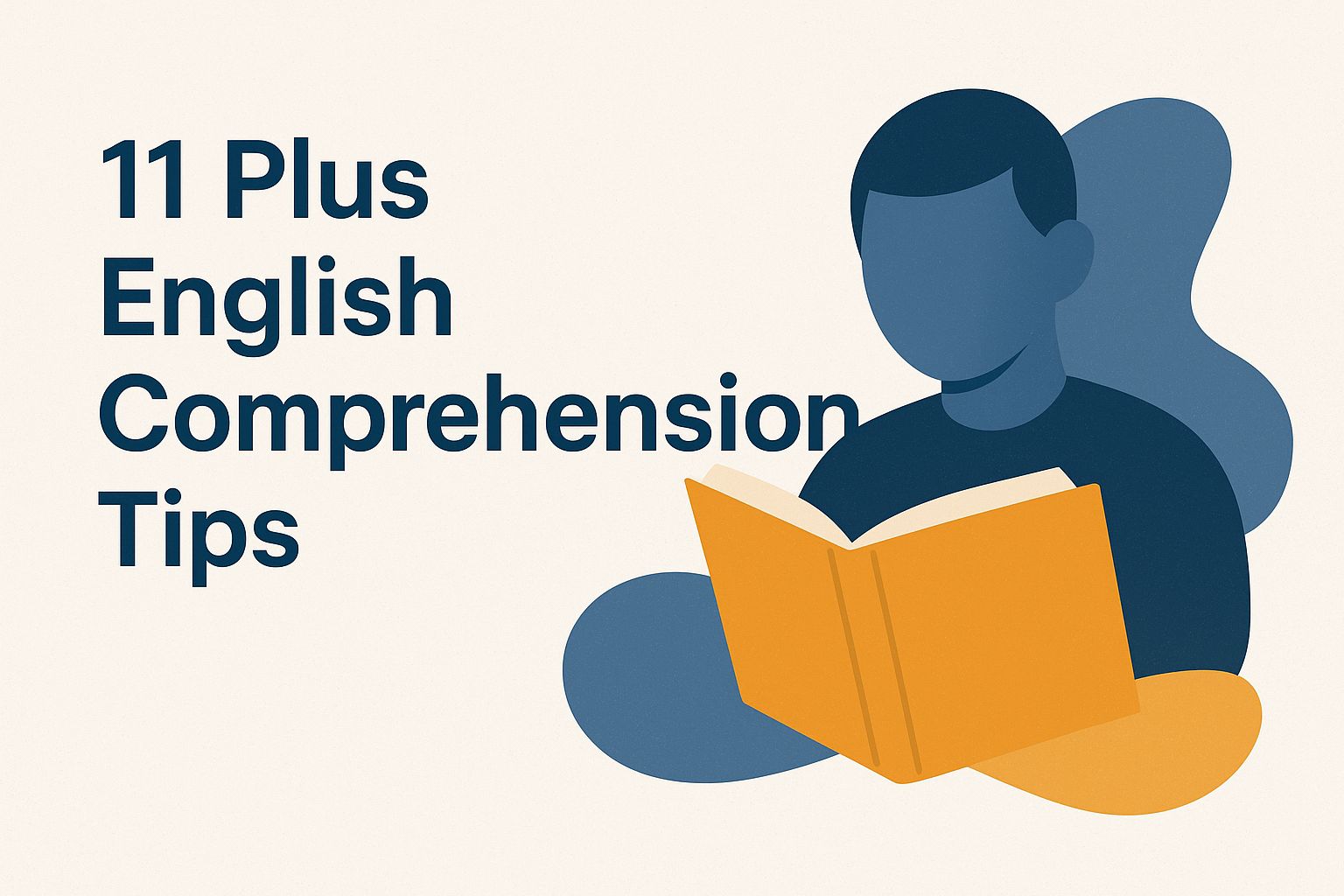
11 Plus English Comprehension Tips
Nervous about the 11 Plus English comprehension test? You’re not alone! This crucial exam can feel daunting, but mastering a few key strategies can make a world of difference. Understanding how to identify main ideas, recognise supporting details, and make inferences is essential.
If you’re looking for practical 11 plus English comprehension tips, this guide will walk you through proven methods to strengthen reading skills and build exam confidence. Plus, we’ll explore techniques for effective reading and practice methods that can boost your confidence. Ready to dive into tips that could set you up for success? Let’s get started!
Understanding the 11 Plus Exam
The 11 Plus exam generally consists of four main components: English, Mathematics, Verbal Reasoning, and Non-Verbal Reasoning. The English section, particularly comprehension, demands strong reading and analytical skills.
Excelling in the English portion can significantly boost overall test scores. It is advisable for students to practise past papers consistently, paying special attention to comprehension passages in order to enhance both reading speed and understanding.
For instance, resources such as the Bond 11+ series offer high-quality practise materials. Additionally, expanding vocabulary with tools like Quizlet can be quite advantageous; research indicates that students with a richer vocabulary tend to achieve higher pass rates.
Furthermore, regularly tracking progress through mock tests can help pinpoint areas needing improvement, allowing for a more focused and effective study strategy. For those curious about what topics to focus on, you might appreciate our guide on subjects covered in the 11 Plus exam.
Importance of English Comprehension
English comprehension skills are fundamental not only for success in the 11 Plus exam but also for continuous academic achievement, as they serve as a foundation for critical thinking and effective communication.
Mastering English comprehension can lead to notable improvements in academic performance. For example, students who engage deeply with texts often experience a rise in their grades of 10-20%, particularly in subjects that depend heavily on reading and analysis, such as literature and history.
Having strong comprehension skills significantly enhances a student’s ability to engage in discussions and articulate ideas clearly, both of which are invaluable in classroom environments and in everyday life.
Additionally, tools such as reading apps and online courses can further support this development, offering personalised learning experiences that address individual needs.
Key Skills for English Comprehension
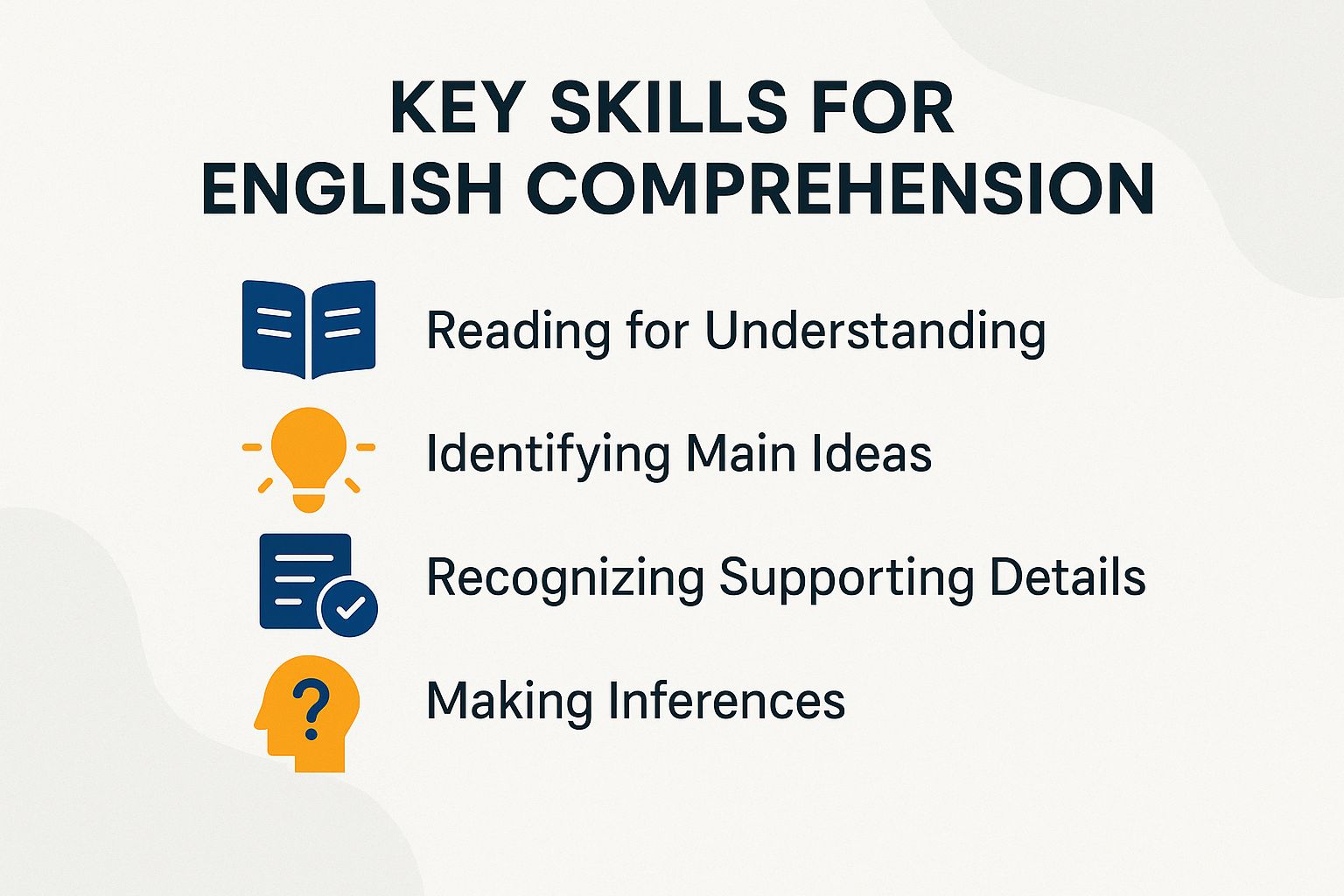
To excel in English comprehension, it is essential for students to cultivate several key skills that will enhance their ability to interpret and analyse texts effectively.
Reading for Understanding
Reading for understanding requires active engagement with the text, prompting students to pause, reflect, and clarify meanings as they progress through their reading.
To enhance comprehension, students can employ specific techniques. Setting reading goals, such as summarising each chapter, can help improve their focus. Utilising graphic organisers, such as Venn diagrams or mind maps, enables them to visualise the relationships between concepts.
Additionally, encouraging students to summarise paragraphs or sections in their own words fosters a deeper understanding of the material.
For instance, after reading a passage, they can jot down key points and questions that arise. Regular practice with these methods, perhaps through structured reading workshops, can significantly enhance their analytical skills and retention of information.
Identifying Main Ideas
Identifying main ideas is essential for understanding the essence of a passage, as it allows students to concentrate their analysis on the text’s core message.
To effectively pinpoint these main ideas, begin by reading the passage carefully. Look for topic sentences, which are often located at the beginning of paragraphs and succinctly capture the primary thoughts.
Next, consider creating a concept map: place the main theme in the centre and branch out with related ideas and supporting details. For further practice, select a variety of articles and summarise them using this approach.
Aim to distil the content into a single sentence that encapsulates its core message. This exercise will not only sharpen your analytical skills but also enhance your overall comprehension.
Recognizing Supporting Details
Recognising supporting details is essential for enhancing comprehension, as these elements provide the necessary evidence and context to fully understand the main ideas.
To improve your ability to identify supporting details, it can be helpful to ask yourself specific questions while reading. For example, consider the following:
- What examples does the author provide?
- Are there statistics or research findings that strengthen the argument?
Utilising tools such as highlighters or annotation apps can be quite effective. Marking supporting sentences or phrases directly in the text promotes active reading, which encourages deeper engagement. This method not only helps you grasp key points but also allows you to appreciate their significance within the overall narrative.
Making Inferences
Making inferences enables students to draw conclusions based on implicit meanings within the text, which enhances their overall interpretative abilities. To develop this important skill, students can focus on strategies such as analysing character motivations and recognising tone.
For instance, when encountering a passage that describes a character’s clenched fists and tight lips, students can infer that the character is likely feeling angry or upset. Encouraging them to pose questions like,
“What does the author imply about the character’s feelings?”
can significantly deepen their comprehension.
Additionally, past 11 Plus papers often feature passages that require such inference, so practising with a variety of texts can greatly prepare students for these challenges.
Strategies for Effective Comprehension
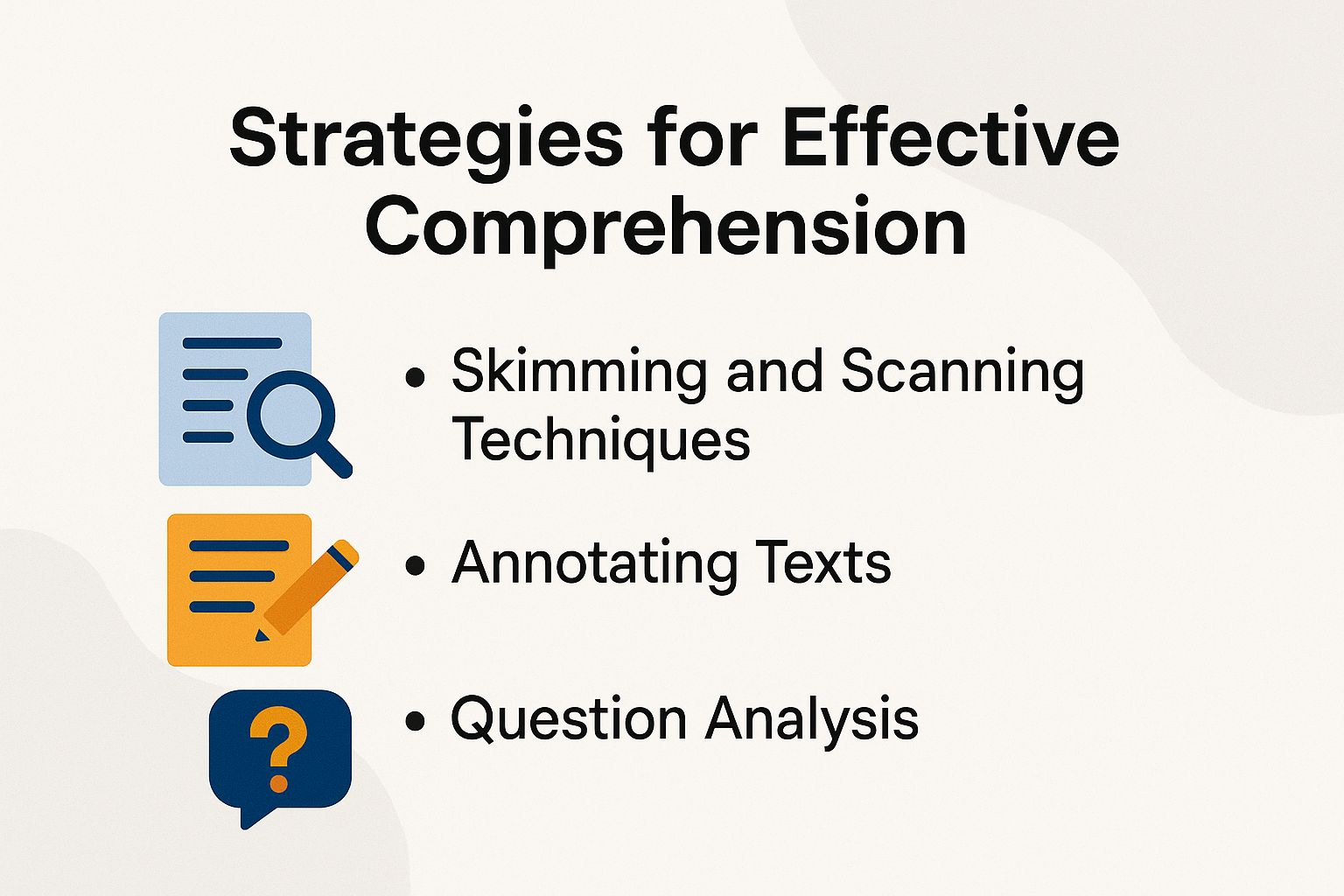
Effective comprehension strategies serve as essential tools that assist students in navigating complex texts and improving their engagement with reading materials. For those preparing for English exams, exploring 11+ comprehension tips can significantly enhance their understanding and interaction with the material.
These strategies give the power to students to better understand and interact with what they are reading, ultimately leading to a more enriching educational experience.
Skimming and Scanning Techniques
Skimming and scanning are efficient reading techniques that allow students to quickly locate key information without diving into every detail.
To effectively practise skimming, one can take a short text and time themselves to read it within two minutes. During this exercise, focus on headings, subheadings, and bolded terms to capture the main ideas.
For scanning, the approach involves selecting a specific piece of information, such as a date or statistic, and quickly moving your eyes over the text until you locate it. Engaging in exercises like these can significantly improve both reading speed and accuracy.
It is advisable to use skimming as a preparation tool for exams and to employ scanning when searching for specific data within research materials.
Annotating Texts
Annotating texts involves making notes and comments directly on the material, which can significantly enhance both retention and understanding.
To annotate effectively, you might consider using specific symbols: underlining key terms for emphasis, placing asterisks next to important concepts, and using question marks for points that require clarification.
Additionally, margin notes can serve as a space for personal insights or concise summaries of paragraphs. For example, you might reflect on a passage that states,
“Reading enhances comprehension, while annotating solidifies that understanding.”
As you read, it can be beneficial to highlight important ideas and jot down brief comments in the margins about how those ideas relate to your own experiences. This method not only aids in comprehension but also simplifies the review process later on.
Question Analysis
Question analysis allows students to break down the various types of questions they will face, equipping them to respond with confidence during assessments. Common question types include multiple-choice, short answer, and essay questions.
To effectively analyse these, it is important to identify the directive words, such as “describe” for essays or “select” for multiple-choice questions.
To practise this skill, students can develop questions in each category. For example, they might create a multiple-choice question regarding key historical events and a short answer question addressing their significance.
This exercise not only reinforces understanding but also familiarises students with different formats, ultimately enhancing their readiness for exams.
Practice Techniques
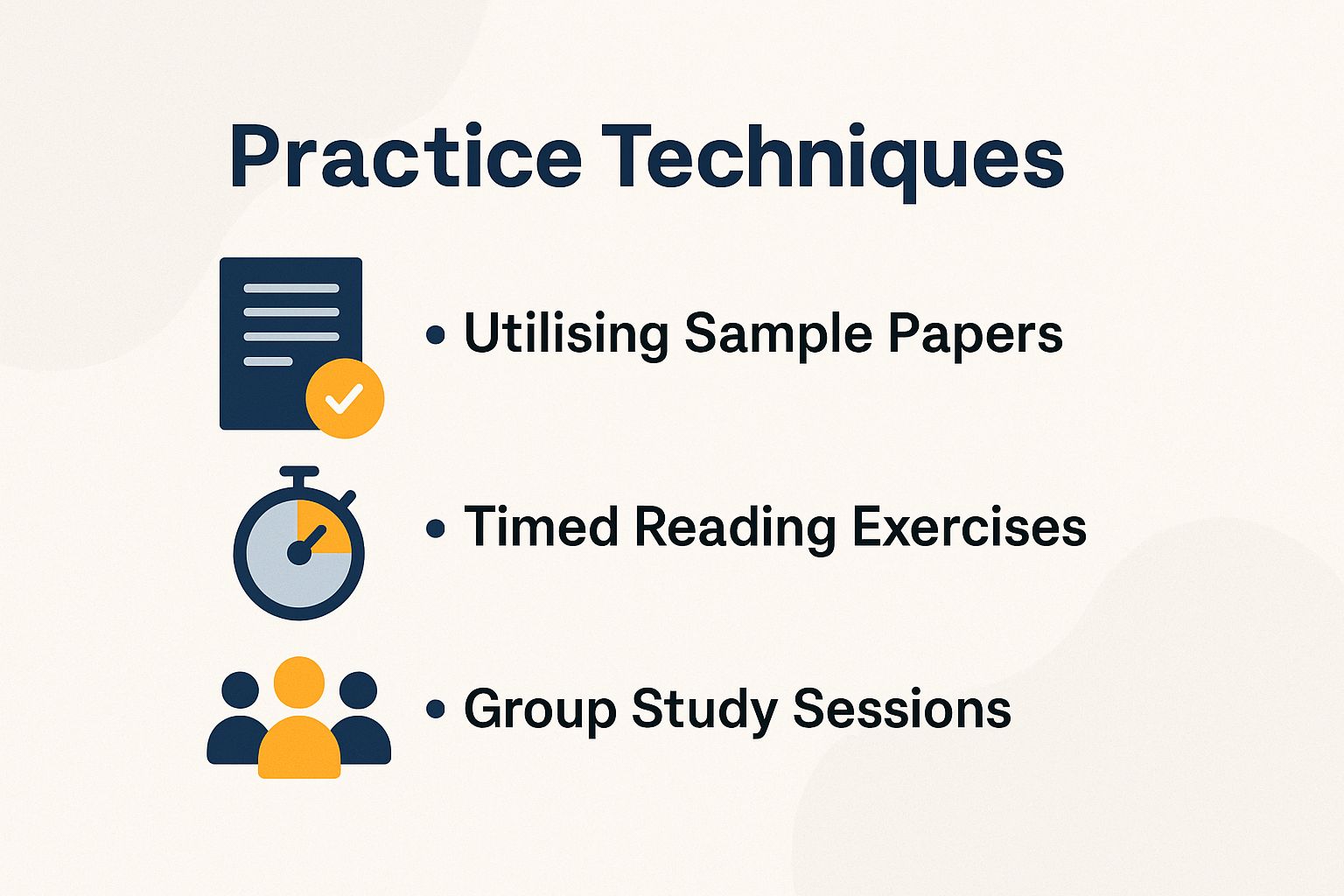
Consistent practice is essential for mastering English comprehension skills, and there are a variety of techniques that can significantly enhance student preparation. By engaging in regular practice, students can improve their understanding and application of the language, ultimately leading to greater proficiency.
To further support your child’s journey, consider exploring our 11+ Comprehension Tips for practical strategies and insights that foster exam success.
Utilising Sample Papers
Utilising sample papers from previous 11 Plus exams offers students valuable real-world experience and a clear understanding of the exam format and question styles. To make the most of this practice, it is advisable for students to schedule dedicated practice sessions twice a week.
Begin these sessions by timing oneself as if in a real exam; this approach helps to develop both speed and stamina.
Once a paper is completed, it is important to review the answers thoroughly, paying particular attention to any incorrect responses in order to identify knowledge gaps. Resources such as the GL Assessment website and various educational publishers provide downloadable sample papers, and local libraries may also offer physical copies.
Consistently tracking progress is essential, as it will foster improvements in both confidence and performance.
Timed Reading Exercises
Timed reading exercises serve as an effective method for students to enhance their reading speed and comprehension while under pressure, closely simulating examination conditions.
To implement timed reading, one can begin by selecting short passages that are appropriate for the students’ year level. Next, set a timer for 1 to 5 minutes and ask the students to read as much as they can within that timeframe. Once the timer concludes, have them answer comprehension questions related to the text.
Utilising tools like ReadTheory can be beneficial, as it offers practice passages at various levels and allows for progress tracking over time. It is also helpful to encourage students to revisit previously completed passages to assess their improvement in speed and understanding, fostering a sense of accomplishment and motivation in the process.
Group Study Sessions
Group study sessions foster collaborative learning, allowing students to engage in discussions about comprehension strategies and work together to clarify any misunderstandings.
To enhance the effectiveness of group study, it is beneficial to incorporate specific practices.
- Begin with discussion questions that highlight key themes and concepts from your coursework; for instance, consider asking how different theories apply to real-world situations.
- Role-playing can also be an effective tool for exploring various perspectives on complex topics, promoting a deeper understanding.
Additionally, establishing ground rules can help maintain focus during study sessions. Limiting distractions, such as agreeing on phone usage, and designating a note-taker to summarize discussions can contribute to a more productive environment.
These structured approaches create an engaging atmosphere, ultimately enhancing retention and collaboration among group members.
Common Types of Comprehension Questions
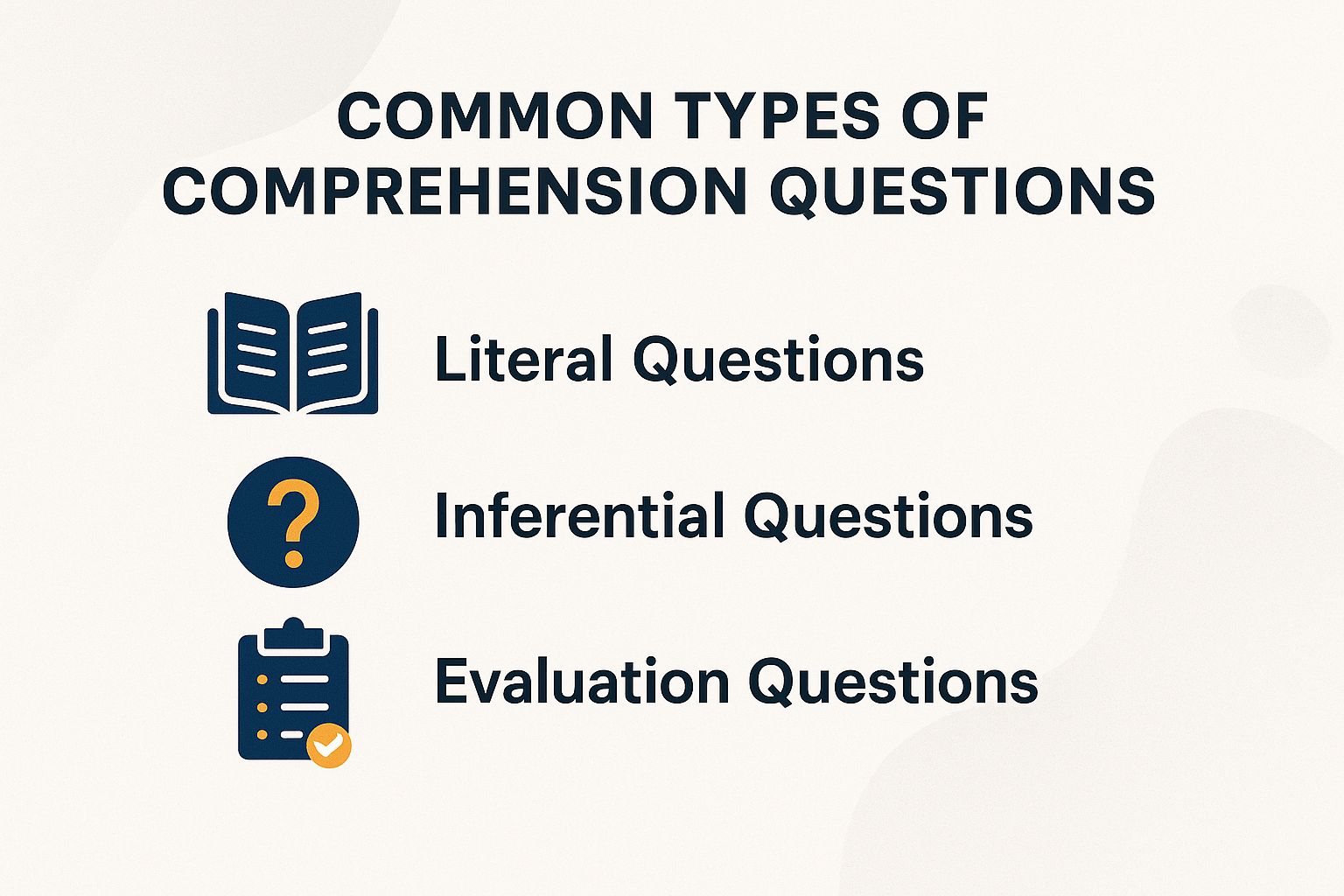
Understanding the common types of comprehension questions provides students with the necessary tools to tackle the various challenges they will encounter in the 11 Plus examination. For those seeking effective strategies, exploring some 11+ comprehension tips can be incredibly beneficial in helping students succeed in English exams.
Literal Questions
Literal questions centre around the explicit meaning of the text, requiring students to recall specific information and details that are clearly stated. To effectively tackle these types of questions, students can use strategies such as underlining key phrases in the text, which aids in identifying relevant details.
Another useful method involves summarising paragraphs in their own words to reinforce their understanding.
For example, consider the passage: “The solar system consists of the Sun, eight planets, and various celestial bodies.” A literal question stemming from this might be, “What are the main components of the solar system?” The answer can be directly found in the text, which supports the understanding of literal comprehension.
Inferential Questions
Inferential questions encourage students to read between the lines, requiring a deeper understanding of the text to draw conclusions that may not be explicitly stated. To address inferential questions effectively, students can utilise a range of strategies.
First, it is beneficial to identify context clues within the surrounding text, such as word choices or imagery that may suggest deeper meanings. Additionally, considering the author’s tone—whether it is sarcastic, serious, or humorous—can provide valuable insight into the implied message.
Students might practise with questions like:
- “What can be inferred about the character’s feelings based on their actions?”
- “How does the setting influence the plot development?”
By regularly engaging with these strategies across various texts, students can enhance their comprehension and critical thinking skills.
Evaluation Questions
Evaluation questions prompt students to assess the effectiveness of a text by considering aspects such as themes, character motivations, and the overall impact it has on the reader.
To answer these questions effectively, students should aim to provide clear, evidence-based insights. For example, when discussing a character’s motivations, it is essential to reference specific passages that illuminate key decisions or emotions, particularly those highlighting internal conflicts.
Additionally, analysing recurring themes, such as friendship or betrayal, with relevant examples from the narrative can enhance their arguments.
By reviewing past 11 Plus papers, students will notice that high-scoring responses frequently incorporate direct quotations and personal reflections, showcasing a thorough understanding of the text.
Tips for Test Day
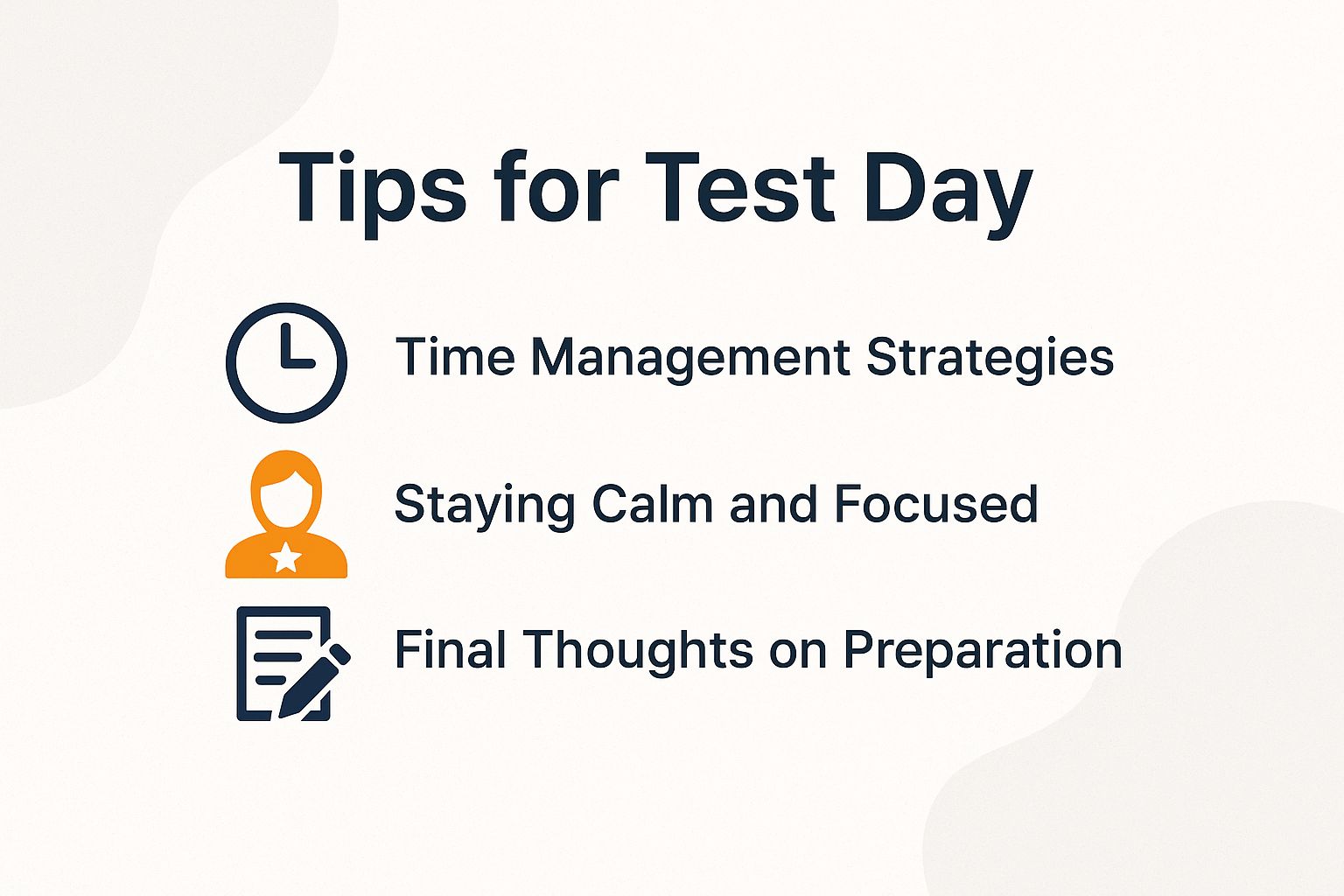
A well-structured plan for test day can greatly improve a student’s performance and boost their confidence during the 11+ exam.
Time Management Strategies
Effective time management strategies during an examination can significantly alleviate the feeling of being rushed, enabling students to allocate appropriate time to each question.
Begin by estimating the total time available for the examination. For instance, in a 120-minute examination with five questions, it would be wise to allocate approximately 24 minutes to each question.
Utilising a timer can help maintain accountability; set it for each segment of time. It is also beneficial to prioritise questions based on their difficulty. Tackling the easier questions first can help build confidence and secure some points early on.
If a particular question is taking longer than the designated time, it is advisable to mark it and move on—returning to it later if time allows. This strategy not only enhances focus but also helps to reduce anxiety during the examination.
Staying Calm and Focused
Remaining calm and focused during the exam is crucial for achieving optimal performance. This approach helps to reduce anxiety and allows students to think more clearly.
To prepare mentally, it may be beneficial to consider some relaxation techniques. For instance, practising deep breathing exercises can be effective; try inhaling for four counts, holding for four counts, and then exhaling for four counts.
Additionally, positive affirmations can serve as a helpful tool—repeating phrases such as “I am prepared” or “I can do this,” either aloud or in your mind, can reinforce your confidence.
Creating a checklist is also advisable. Ensure that you have all necessary materials ready, arrive early to avoid any rushed feelings, and remember to stay hydrated.
By incorporating these methods into your routine, you can significantly enhance your mindset before tackling the exam.
Final Thoughts on Preparation
With careful preparation and an emphasis on comprehension skills, students can approach the 11 Plus exam with both confidence and clarity.
To achieve success, it is advisable for students to implement a structured study plan. This begins with identifying key topics, such as mathematics, verbal reasoning, and comprehension.
Utilising resources like past exam papers from the Eleven Plus Consortium can help familiarise students with question formats. It is beneficial to allocate specific study blocks each week—perhaps dedicating two hours to mathematics, followed by an hour on reading comprehension.
Additionally, employing tools such as Quizlet for vocabulary flashcards or apps like Exam Countdown to keep track of important dates can be quite helpful. Maintaining consistency in practice and reviewing mistakes is essential for building confidence and mastering the content effectively.
Frequently Asked Questions
What is the 11 Plus exam?
The 11 Plus exam is an entrance exam taken by students in their final year of primary school in the UK. It is used to assess their ability to join grammar schools and other selective secondary schools.
What is the purpose of 11 plus English comprehension tips?
11 Plus English comprehension tests students’ ability to read and understand written texts. It also assesses their ability to infer and interpret information from the texts.
How can I improve my 11 Plus English comprehension skills?
To improve your 11 Plus English comprehension skills, practice reading a variety of texts and answering questions about them. Pay attention to the language used, and use context clues to help you understand unfamiliar words or phrases. Practice summarising and inferring information from the texts as well.
What is the importance of time management in 11 Plus English comprehension?
Time management is crucial in the 11 Plus English comprehension exam because students have a limited amount of time to read and answer questions about multiple texts. Practising with time limits will help you get used to the pace of the exam and ensure you can complete all questions in the allocated time.
Are there any specific techniques to use for 11 Plus English comprehension?
Yes, there are various techniques that can help students improve their 11 Plus English comprehension skills. These include skimming the text before answering questions, underlining or highlighting important information, and using visual aids such as diagrams to help understand complex texts.
What resources can I use to practice 11 Plus English comprehension?
There are many resources available, such as practice books, online quizzes, and sample papers, that can help you prepare for 11 Plus English comprehension. You can also ask your teacher or tutor for additional practice materials and guidance on improving your skills.



